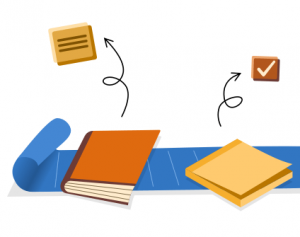Studying at home is quite distinct from attending a physical classroom. It requires discipline, active engagement, and strategic planning. Staying focused and motivated can be challenging, especially with numerous distractions at home, such as your phone and TV. Here are some practical tips to help you maintain productivity and concentration during remote study sessions.
1. Engage in Virtual Study Groups
Participating in virtual study groups can significantly enrich your remote learning journey. These groups create a collaborative and interactive environment that deepens your understanding of course materials. Engaging in discussions, explaining complex concepts to your peers, or listening to their insights provides fresh perspectives and fosters clarity on challenging subjects. As Albert Einstein once said, “If you can’t explain it simply, you don’t understand it well enough.”
Beyond academic advantages, study groups maintain a sense of accountability through shared commitments to deadlines and active participation in group discussions. This not only reinforces regular study habits but also sharpens your focus. Additionally, virtual study groups offer emotional support and a sense of belonging, effectively combatting feelings of isolation that remote learners might encounter. The camaraderie and shared experiences within the group create a supportive environment that encourages persistence and motivation.

2. Create a Distraction-Free Zone
Selecting the ideal study spot at home is crucial for increasing productivity. Find a quiet, well-lit area with minimal distractions, and set up a dedicated desk or table to keep your study materials organized. This designated space helps draw a clear boundary between work and leisure, signaling to your brain when it’s time to concentrate. Personalize this area with inspiring elements like green plants, motivational quotes, or personal touches to create an inviting atmosphere for effective learning.
Establishing an environment conducive to concentration involves creating a dedicated and clutter-free study space free from distracting elements. Strategies like silencing phone notifications, temporarily disconnecting from social media, and quietly playing instrumental music can optimize your time usage. These habits lead to a more efficient and less stressful online learning experience, enabling you to accomplish tasks more effectively and manage your time wisely. From my experience, having a consistent study schedule is key. I set specific hours for study and breaks, treating them like actual class times. This routine helps my mind switch into “study mode” and maintains a healthy work-life balance.

3. Update Your Technology
In remote learning, technology plays a central role in your study environment. Ensure your computer and internet connection are reliable. Keeping your software tools up-to-date with the latest versions and security updates is crucial for a safe and dependable learning experience. Utilize productivity apps to streamline your workflows, manage your time efficiently, and boost your productivity.
Cloud storage services allow you to access your study materials from any device with an internet connection, ensuring your resources are always within reach. This flexibility prevents the loss of important documents and eliminates the need to be tied to a single device. Embracing modern technology not only enhances your study sessions but also equips you to adapt to a digital learning environment seamlessly. On a personal note, I highly recommend investing in a good pair of noise-canceling headphones. They are a game-changer for blocking out distractions and helping you stay focused, especially in a busy household.

4. Take Notes
Watching lectures on a computer allows students the convenience of adjusting the playback speed or replaying sections. Taking notes while doing so helps you capture the essentials in simple, understandable language. This practice increases your focus and improves your critical thinking. Use a notebook or a digital note-taking app to minimize distractions and prevent switching between browser tabs during lessons.
Digital note-taking apps offer the advantage of searchable, organized notes. These apps allow you to categorize notes by subject, making it easier to review and locate specific information when needed. With digital notes, you can quickly search for keywords or topics, saving valuable time during revision or while working on assignments. The flexibility of digital notes also enables you to access study materials from various devices, ensuring your notes are always at your fingertips. I find it helpful to use color-coded notes. Highlighting key concepts in different colors helps me visualize and remember information more effectively. Plus, it makes reviewing notes much more engaging.

5. Exercise Consistently
Physical activity is an integral part of the daily routine for remote learners. Starting your day with a workout can provide an energy boost, helping maintain focus and absorb information effectively. Regular physical activity has been linked to improved memory and cognitive functions, which are especially beneficial for processing substantial amounts of information. As John F. Kennedy once remarked, “Physical fitness is not only one of the most important keys to a healthy body, but it is also the basis of dynamic and creative intellectual activity.”
Exercise also helps alleviate anxiety and fosters a relaxed and focused mindset, crucial for remote learners facing unique challenges. It contributes to better sleep quality, leading to improved concentration. Engaging in activities such as walking, yoga, or even short home workouts promotes a successful remote learning experience. I make it a point to take short, active breaks between study sessions. Even a quick 10-minute walk or some stretching exercises can rejuvenate your mind and body, making your study time more productive.

Studying from home may seem convenient, but procrastination and distractions are common challenges. Overcoming these obstacles requires practice and perseverance. As with any skill, the more you practice, the sooner you’ll notice improvements in your concentration and productivity. Try these tips, stay disciplined, and change your home into an effective learning environment.




